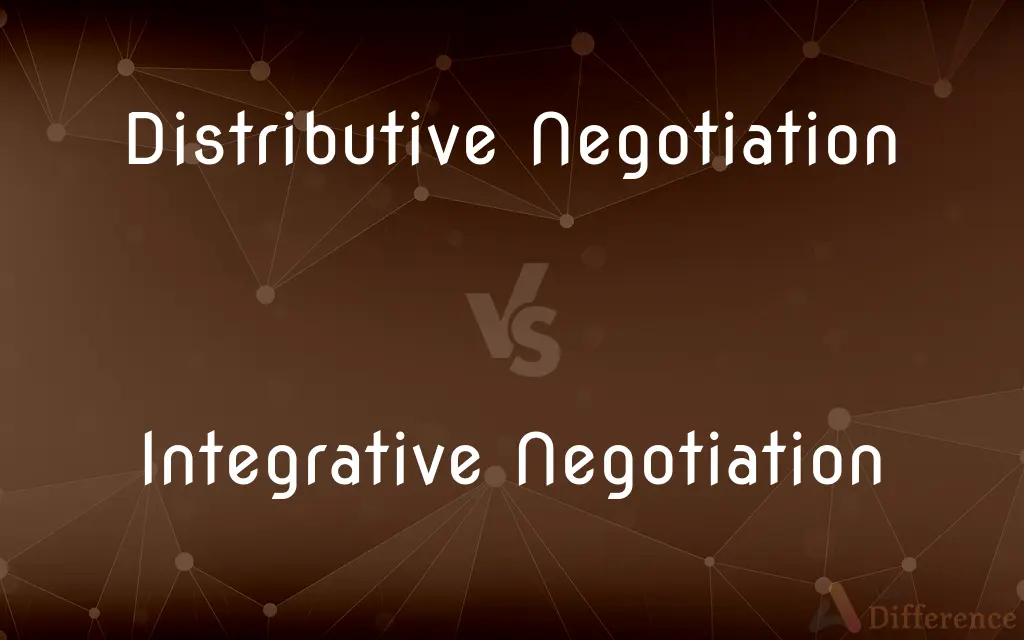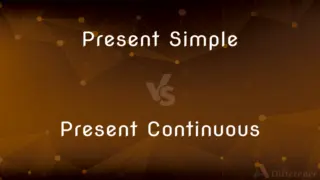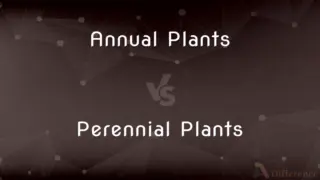Distributive Negotiation vs. Integrative Negotiation — What's the Difference?
Edited by Tayyaba Rehman — By Fiza Rafique — Published on December 18, 2023
Distributive Negotiation focuses on dividing a fixed resource ("win-lose"), whereas Integrative Negotiation seeks win-win solutions by combining resources or interests.

Difference Between Distributive Negotiation and Integrative Negotiation
Table of Contents
ADVERTISEMENT
Key Differences
Distributive Negotiation revolves around the idea that one party's gain is another's loss. In contrast, Integrative Negotiation emphasizes collaboration, aiming for solutions beneficial to all involved parties.
At its core, Distributive Negotiation is about distributing a fixed set of resources. On the flip side, Integrative Negotiation explores ways to integrate or combine the interests of both parties to create value.
When entering a Distributive Negotiation, parties often have a competitive mindset, aiming to get the larger share. Meanwhile, Integrative Negotiation encourages a cooperative approach, with participants finding synergies and shared goals.
Distributive Negotiation is commonly seen in scenarios with limited resources, like haggling over a price. However, Integrative Negotiation flourishes in situations where parties can find mutual benefits, like in long-term business partnerships.
Often, Distributive Negotiation may lead to strained relationships post-negotiation. Conversely, Integrative Negotiation fosters stronger relationships as all parties feel they've achieved a favorable outcome.
ADVERTISEMENT
Comparison Chart
Nature of Outcome
Win-lose
Win-win
Approach
Competitive
Cooperative
Resource Mindset
Fixed resource to be divided
Resources or interests can be combined
Relationship Post-Negotiation
Often strained
Typically strengthened
Common Scenario
Price haggling
Long-term business partnerships
Compare with Definitions
Distributive Negotiation
Competition-based negotiation.
The estate sale turned into a fierce Distributive Negotiation over the antique desk's final price.
Integrative Negotiation
Fosters long-term relationships and trust.
Integrative Negotiation between the supplier and retailer led to years of productive collaboration.
Distributive Negotiation
A win-lose negotiation approach.
Bargaining for a car's price involved Distributive Negotiation as both parties aimed for their ideal price.
Integrative Negotiation
A win-win negotiation approach.
The two companies engaged in Integrative Negotiation to form a mutually beneficial partnership.
Distributive Negotiation
Parties aim to maximize their individual share.
The Distributive Negotiation over land division saw each heir vying for the most valuable plots.
Integrative Negotiation
Seeks to combine interests for shared gains.
The teams used Integrative Negotiation to merge their ideas into a singular, innovative product.
Distributive Negotiation
Focuses on dividing a set resource.
The Distributive Negotiation between the two firms centered on splitting the revenue percentage.
Integrative Negotiation
Emphasizes collaboration and mutual benefits.
Integrative Negotiation led to a new city project that catered to both residents and businesses.
Distributive Negotiation
Zero-sum approach to negotiation.
In the Distributive Negotiation over the artwork, the seller aimed for a high price, while the buyer pushed for a discount.
Integrative Negotiation
Focuses on creating value for all parties.
Through Integrative Negotiation, the neighbors found a solution that addressed everyone's concerns.
Common Curiosities
Is trust more crucial in Distributive Negotiation or Integrative Negotiation?
Trust is crucial in both but even more so in Integrative Negotiation due to its collaborative nature.
Is Distributive Negotiation always about conflict?
No, but it is about dividing a set resource, often leading to competitive stances.
Is Distributive Negotiation short-term focused?
It can be, especially when it's about a one-time resource division like price.
Are there scenarios where both Distributive Negotiation and Integrative Negotiation are used?
Yes, complex negotiations can have elements of both, depending on the issues at hand.
Can a negotiation start as Distributive Negotiation and transition to Integrative Negotiation?
Yes, if parties recognize mutual benefits beyond the initial resource in question.
How does Integrative Negotiation benefit relationships?
It fosters collaboration, trust, and often results in strengthened relationships.
Which negotiation type is best for long-term partnerships?
Integrative Negotiation, as it seeks mutual benefits and fosters collaboration.
Can Integrative Negotiation always produce win-win outcomes?
Ideally, yes, but it requires collaboration and a willingness from all parties to find mutual benefits.
When is Distributive Negotiation most commonly used?
In situations with a fixed resource, like price negotiations.
What mindset should one have entering an Integrative Negotiation?
A collaborative mindset, looking for synergies and shared benefits.
Share Your Discovery

Previous Comparison
Present Simple vs. Present Continuous
Next Comparison
Annual Plants vs. Perennial PlantsAuthor Spotlight
Written by
Fiza RafiqueFiza Rafique is a skilled content writer at AskDifference.com, where she meticulously refines and enhances written pieces. Drawing from her vast editorial expertise, Fiza ensures clarity, accuracy, and precision in every article. Passionate about language, she continually seeks to elevate the quality of content for readers worldwide.
Edited by
Tayyaba RehmanTayyaba Rehman is a distinguished writer, currently serving as a primary contributor to askdifference.com. As a researcher in semantics and etymology, Tayyaba's passion for the complexity of languages and their distinctions has found a perfect home on the platform. Tayyaba delves into the intricacies of language, distinguishing between commonly confused words and phrases, thereby providing clarity for readers worldwide.
















































